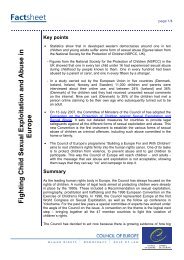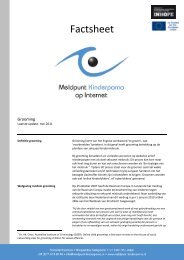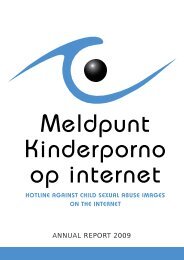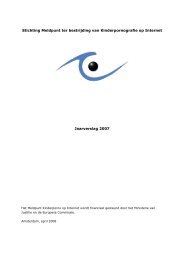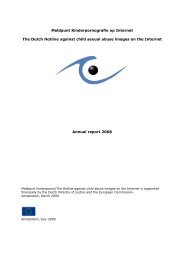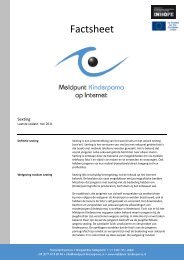sexual exploitation of children over the internet - Meldpunt ...
sexual exploitation of children over the internet - Meldpunt ...
sexual exploitation of children over the internet - Meldpunt ...
Create successful ePaper yourself
Turn your PDF publications into a flip-book with our unique Google optimized e-Paper software.
Krwawecz testified that, in his experience, employing a web crawler service that usescertain terms found on child pornography websites would be impractical because <strong>the</strong>search would turn up thousands <strong>of</strong> results, most <strong>of</strong> which do not contain childpornography content. As mentioned previously, financial services companies do employweb crawlers as well as conduct o<strong>the</strong>r searches in order to identify inappropriate content.Ms. Jones and Mr. Krwawecz also explained that <strong>the</strong>y typically learn thatwebsites <strong>the</strong>y host contain inappropriate content through reports or complaints fromoutside parties. Once a report is made, Ms. Jones testified that GoDaddy.com initiates aninvestigation to determine if <strong>the</strong> website contains child pornography or child modelingand immediately suspends and reports websites that contain child pornography content.With regard to child modeling websites, Ms. Jones stated that GoDaddy.com routinelysuspends websites that show images <strong>of</strong> <strong>children</strong> posed in a manner intended to be“explicitly sexy”; posed in adult lingerie; or <strong>children</strong> who are partially nude or in verylittle clothing “not associated with normally acceptable situations.” Similarly, Mr.Krwawecz stated that it is <strong>the</strong> policy <strong>of</strong> his company to investigate <strong>the</strong> reports it receivesand to disable <strong>the</strong> accounts <strong>of</strong> websites that contain “blatant illegal content.” However,with regard to potential child modeling websites, Mr. Krwawecz states that his companyrequests pro<strong>of</strong> <strong>of</strong> age for <strong>the</strong> models from <strong>the</strong> website, and if “satisfactory pro<strong>of</strong>” cannotbe provided, <strong>the</strong> website is terminated. Although websites hosted by Mr. Krwawecz’scompany included <strong>sexual</strong>ly solicitous posing <strong>of</strong> <strong>children</strong> who appeared as young as eightor nine-years-old, <strong>the</strong>re is no evidence that Mr. Krwawecz was aware <strong>of</strong> this content and,once notified <strong>of</strong> <strong>the</strong> websites prior to <strong>the</strong> hearing, immediately terminated <strong>the</strong>m.As noted earlier, web hosting companies, domain registries, credit cardcompanies, social networking sites, and cellular telephone carriers, are not clearly subjectto <strong>the</strong> reporting requirements <strong>of</strong> 42 U.S.C. § 13032 or o<strong>the</strong>r provisions. While certainfinancial services companies have taken a proactive approach to working with NCMECon <strong>the</strong> problem <strong>of</strong> commercial child pornography websites, and in reporting into <strong>the</strong>CyberTipline without a legal obligation to do so, not all firms that pr<strong>of</strong>it from <strong>the</strong>sewebsites have followed suit. More importantly, many industries do not even know about<strong>the</strong> CyberTipline or whe<strong>the</strong>r <strong>the</strong>y can, should, or must report into <strong>the</strong> CyberTipline. Forexample, due to <strong>the</strong> urging <strong>of</strong> NCMEC and a question posed by <strong>the</strong> Subcommittee at <strong>the</strong>June 28 th hearing, in August 2006, <strong>the</strong> FCC issued an advisory opinion that cellulartelephone carriers would not be precluded by o<strong>the</strong>r statutory requirements fromcomplying with <strong>the</strong> reporting requirements <strong>of</strong> 42 U.S.C. § 13032.Without any mechanism by which to track <strong>the</strong> number <strong>of</strong> Internet ServiceProviders, web hosting companies or domain registries in <strong>the</strong> U.S., it is also difficult togive notice to <strong>the</strong>se entities <strong>of</strong> <strong>the</strong>ir statutory obligations, <strong>the</strong> existence <strong>of</strong> <strong>the</strong>CyberTipline, NCMEC, and <strong>the</strong> VGT, as well as <strong>the</strong> development <strong>of</strong> best practices.Clearly, nei<strong>the</strong>r current legal requirements nor voluntary action have been apparentlysufficient to put a significant dent in <strong>the</strong> problem <strong>of</strong> <strong>sexual</strong> <strong>exploitation</strong> <strong>of</strong> <strong>children</strong> <strong>over</strong><strong>the</strong> Internet.34




